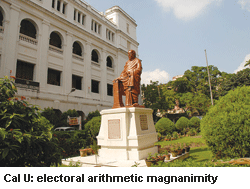By far the largest university in eastern India — and among the largest in India — with 232 affiliated colleges and an aggregate enrolment of 300,000 students, the University of Calcutta (U-Cal, estb. 1857) packs a lot of punch in the eastern seaboard state of West Bengal (pop. 80 million). U-Cal’s policies influence the administration of undergraduate and postgrad colleges throughout the state and even in neighbouring states. Therefore when U-Cal changes any of its policies — a rare event — it’s big news in Kolkata and its hinterland, because the changes are bound to affect several hundred thousand pupils enroled in the 232 colleges affiliated with it.
Therefore two seemingly innocuous measures decreed by the state govern-ment funded U-Cal on August 20, has set the dovecotes of West Bengal’s academia aflutter. First, the varsity’s undergraduate council has institution-alised the award of ‘grace marks’. Thus examinees whose answer papers are awarded 39, 44, 49, 54 or 59 will henceforth be magnanimously awarded a grace mark so that their mark sheets show 40, 45, 50, 55 and 60 respectively.
 The significance of this ostensibly minuscule concession is that 40 is the pass mark while an answer paper awarded 60 or more is graded first class. The second populist measure decreed by the undergraduate council is that honours (single subject) students can be awarded a degree even if they’ve failed their first two years’ exams.
The significance of this ostensibly minuscule concession is that 40 is the pass mark while an answer paper awarded 60 or more is graded first class. The second populist measure decreed by the undergraduate council is that honours (single subject) students can be awarded a degree even if they’ve failed their first two years’ exams.
Independent academics, i.e those not owing their appointment to the top brass of the Communist Party of India-Marxist (CPM), which has ruled uninterruptedly in West Bengal since 1977, and has established a vice-like grip over state-funded academic institutions, are unanimous that there is electoral arithmetic behind this magnanimity. With over 300,000 students enroled in Cal U and assuming three or four guardians in each student’s family, practising populism helps the CPM — which dominates the Left Front government — to curry favour with 1.2 million voters. With its strength in Parliament in New Delhi considerably reduced following the recent Lok Sabha elections, the CPM is now hell-bent on recovering lost ground in the state assembly elections barely 21 months away.
“Cal U could have solved this ‘one mark’ problem by introducing a grades system to assess exam performance. But its top management lacks the mindset and courage to switch to the globally accepted grades rather than marks allocation system,” says an incumbent vice chancellor speaking on condition of strict anonymity.
The leniency granted to first and second year failures in honours courses, is generating even more heat in the groves of academia in the state. According to a professor teaching in U-Cal for over 20 years, this change of policy is “utterly wrong”. “Weak and under-prepared students will now be admitted into Masters programmes. They will have great difficulty in coping with postgraduate syllabi and curricula. Will U-Cal give them a second dose of leniency?” queries the professor.
But such sophisticated reasoning is unlikely to bother the education cell operating from within CPM headquarters on Alimuddin Street in downtown Kolkata, which is driven by electoral considerations. It has ensured that the Senate body of U-Cal is packed with 167 party members and sympathisers who heed the CPM politburo rather than anguished academics. Ditto West Bengal’s other 17 universities.
Sujoy Gupta (Kolkata)